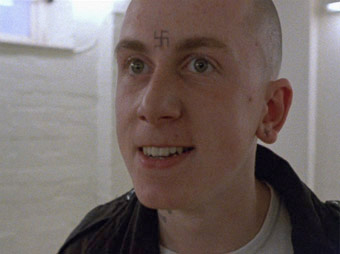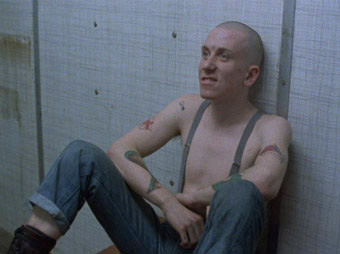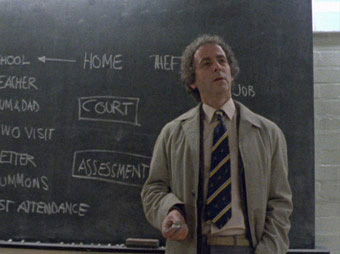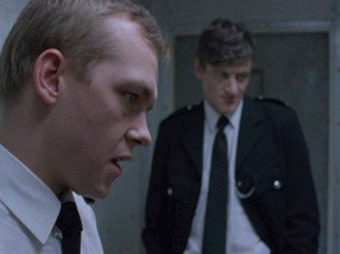| |
"We're all fucking great. You ain't taking bugger all from us, we hate you. You can lock me in here but you can't take away the hate inside my head, I can still hate you in my head. You don't like that, do you." |
| |
Trevor – Made in Britain |
Back in the 1970s, there was a government sponsored attempt
to boost British industry in the face of an increasing
number of cheaper imported goods by prompting a patriotic
approach to British buying habits. 'I'm Backing Britain'
stickers could be found everywhere and Union
Jack styled 'Made in Britain' labels adorned all manner
of locally produced goods. At this point in our history,
myself and many of my fellow countrymen had developed
an uneasy relationship with our national flag, something
even back then you would be pushed to find in many other countries. The Punk Generation was throwing off the
whole concept of a sovereign family and wore tattered
versions of the flag as a sign of their rejection of
its supposed values. On top of that, the Union Jack had been hijacked by the far right as a symbol
of their warped and bigoted definition of patriotism in the face of anything
they deemed as 'not British'.
It is these two representations of nationalism that
are the springboard for David Leland's Made
in Britain, one of four plays for television
screened on consecutive weeks, written by Leland under
the banner Tales Out of School and based around the
theme of education. Of the four, this was without doubt
the most controversial and confrontational. As directed
by Alan Clarke, it also became the single most electrifying television
work of the year.

After
a court appearance for smashing an Asian shopkeeper's
window, 16-year-old skinhead and habitual offender Trevor
is taken to a residential assessment centre by his social
worker, Harry. Although smarter than his behaviour suggests,
Trevor is also aggressive, rebellious and racist. From the moment he arrives, he refuses to co-operate
with those in whose charge he has been placed, and quickly lands himself in even deeper trouble with
his increasingly frustrated guardians.
One
thing that will strike any newcomer to Made
in Britain right off the bat is that Trevor is about as far as you can get from your typical leading character. He is unlikable, violent, short-tempered, self-centered
and childish, yet he is also intelligent, articulate
and rebellious. As an individual for cinematic study,
he is fascinating – but for society at large he represents
a major problem. Trevor does not so much kick against the rules
as refuse to acknowledge that they apply to
him at all, and if he does fall foul of them then he
knows how to mess with the system, or at least he thinks
he does. Like a spoilt child, Trevor is constantly demanding
things – a meal, spending money, the attention of a
job centre employee – and reacts instantly and aggressively
if he does not immediately get his way. His racism is
primitive, tribal and reactionary, a professed hatred
for those who appear different to him and who have what
he has not. Thus he throws a brick through the window
of an asian shopkeeper, but given a room with a young
black offender he immediately strikes up a conversation
with him and later involves him in a number of illegal
activities, including a further act of racially motivated
vandalism. That he verbally abuses him and ultimately
leaves him to take the rap when the two steal and crash
a van from the assessment centre appears not to be racially
driven – Trevor ultimately shits on just about everyone
he meets and would doubtless have done the same had
his companion been white. Trevor clearly likes to exercise
power, and being on the bottom rung of the social ladder,
the only way he knows how to do so is through direct
and sometimes violent confrontation with others.
Hidden
away behind this wall of anger, though, is an intelligence
and reasoning that kicks against the usual skinhead
stereotype. As is made clear in the brilliantly written
and furiously delivered monologue from which the
top quote is taken, Trevor has arrived at his present
attitude not through blind stupidity but by a process
of reactive reasoning. It is this that makes Trevor
such a compelling character and makes the film itself
so challenging, for while it's easy to warm to Trevor's
rejection of authority and to understand his angry deconstruction
of society's definition of honesty, the anarchy he represents is single-mindedly damaging and ultimately
self-destructive. Having been told repeatedly that he
is heading for a life in prison, he now accepts it as
an inevitability but has no intention of going quietly
– if he's going down, then he's going to do it his way.
Trevor is undeniably charismatic and a powerful force
for rebellion, but he is also a frightening and dangerous
figure who cannot ultimately be left unchecked. In many
ways he resembles Alex from A Clockwork
Orange – both are violent, amoral young thugs
whose intelligence and oddball charm makes them as interesting
as they are troubling. But whereas Alex's immorality is safely distanced
by the futuristic setting, his own poetic narration and Kubrick's stylised presentation
of the characters and story, Trevor is all too real.
He's the guy on the corner, down the street, next door; a
product of Right Now. Trevor is most definitely Made
in Britain – society created him and now doesn't know
what to do with him, and it is inevitable that the film-makers
have no answers to this question either. How could they? Like Alex, Trevor learns the hard way that no
matter how tough you are, there is always someone tougher
who will take you down, but unlike Alex, he does not
fall simply to rise again. Trevor is left facing a reality
that he will either learn to survive or be destroyed
by.

Made
in Britain is extraordinary television. The sheer quality of writing in David Leland's script was rare even for its time but seems completely absent
from TV today. Leland never tries to make Trevor likeable,
but by giving him such a powerful voice he forces us
to listen to viewpoints that we are deliberately made to
feel uncomfortable by. Rarely does a film of any description
dare to take on its audience on such difficult terms, feeding
them with one hand and slapping them in the face with
the other. It remains a difficult and confrontational
work, but for all the right reasons.
Similarly
uncompromising is Tim Roth's central performance as
Trevor. Roth famously only got seen at all through a
chance incident – a cycle tyre puncture led him to a youth theatre in which he had previously
worked to borrow a pump, only to discover that auditions
for the film were being held there the next day. He met Alan Clarke
and sold himself for the part. It's
genuinely impossible now to imagine the film without
Roth at its centre – his performance as Trevor is nothing
short of astonishing and is without doubt the key reason
for Trevor's enigmatic screen presence. Everything is just right here, the snarled anger, the sarcastic sneering,
the nitro-powered physicality – Roth plays Trevor as
a ball of furious energy looking for a direction in which to
explode, a missile with a message and a haphazard targeting
system. There are times when you really, really want
someone to slap some sense into him, but there is not
one solitary second that you can take your eyes off
him. When that slap finally comes, you're genuinely
unsure about how to react to it.
With
a central character this powerful and this well acted,
it's a testament to the supporting cast that they are
never overshadowed by Roth and all vividly register,
in part because of the sincerity with which their parts are
written and played. Unlike Roy Minton's script for Scum,
which had a very specific viewpoint and in doing so
cast the warders as almost unremittingly corrupt and
unpleasant, Leland takes no sides here, and if the Assessment
Centre staff and long-suffering social worker Harry
seem both well-meaning and irritable then it's because
they really are trying to help, but just do not know
how to cope with someone like Trevor. Their frustration at him comes
not from intollerence but from having to deal
on a daily basis with difficult customers, of which
Trevor is without doubt one of the most problematic,
in part because he refuses to conform to their (and
our) stereotype of an out-of-control young hooligan.
Just about the only adult Trevor actually listens to
(though he later angrily dismisses him and his teachings)
is the centre's superintendent, who, in a beautifully
written and performed scene, explains to Trevor in detail
the chances he has blown and his future options. Unfussily
shot, this is a sublime wedding of script and performance,
an object lesson to the machine-gun-editing directors
of so many modern mainstream movies in what really makes drama work.

Rounding
it all off, of course, is Alan Clarke's direction. It
was shortly before starting on Made in Britain that Clarke discovered Steadicam and for him this was
clearly a moment of liberation, the crystallisation of the style
that had been gradually emerging since Scum, one that locked on to the main character and stayed with them in a series of long 'walking shots'. This approach
is set from opening scene, in which Trevor, in constant
steadicam close-up, walks through a series of corridors
to the courtroom in which he is to be charged,
accompanied by the aggressive chords of The Exploited's UK82. It's one of my favourite opening shots
ever, a perfect blending of image and sound that iconically
introduces us to the main character and the essence
of the narrative in a stunningly economic and cinematic
way. The camera follows Trevor wherever he goes, and
when Trevor moves he doesn't hang around, but here Clarke
had an ace up his sleeve in the brilliant Chris Menges,
a hugely talented DoP and one of the first UK cameraman to
master the Steadicam. Menges locks in on Trevor and
makes him the film's key concern at all times, reflecting
the instruction to his camera operator that Clarke became
famous for: "This is your man, go with him."
Alan
Clarke was the ideal director to commit Leland's words
to film, investing in the visuals and actors the same
energy and intelligence that roars through the script. Made in Britain is an Alan Clarke film
every bit as much as it is a David Leland film and a
Tim Roth film and a Chris Menges film. It is that collaborative
process that Clarke seemed to savour, and at his best
it is not just Clarke's voice we hear but all of the
voices in the film. Made in Britain – tough, smart, angry, difficult, electrifying and without
peer to this day, is just such a work.
Made
in Britain was not only one of the first British
TV dramas to use Steadicam, it was also a front runner
in its use of new, high-speed film stocks. The allowed
Chris Menges to light locations almost exclusively with
practicals (enhanced versions of lights that would be
naturally be found in the scene), and the combination
of this and the free-floating camera gave almost complete
freedom for the actors. This faster film stock and naturalistic
approach to lighting inevitably produces an image that
is some way short of the crisp transfers we associate
with bigger budget Hollywood movies, especially given
that Made in Britain was shot on 16mm
and that sets and costumes were selected specifically for
their drabness. Given that, this is a most acceptable
transfer of difficult source material, and given the
subject matter this look actually works well for the
film as a whole. There is a bare bones, budget-price
region 2 disk already available of the film from Carlton,
which boasts a very similar transfer to the one seen
here, suggesting they were taken from the same source
(the Carlton logo remains at the end of the Blue Underground
print); there appears to be a fraction more artefact
noise on the Carlton disk, though you really have to
look for it. On transfer quality alone they are evenly
matched – it's on the extras that the Blue Underground
disk wins out. Both transfers are in the original 4:3
aspect ratio.

There's
not much to say about the sound – it was clearly recorded,
has been cleanly reproduced and is in its original mono.
A
special mention should go to the menus, which have been
executed with loving care, really capturing the flavour
of the film and the essence of the time, though have more
of a Sex Pistols punk feel than a skinhead 'Oi!' one. A
particularly nice touch is the Doc Martin boot that comes
in and shatters the main menu when you select the extras.
The
region 2 Carlton disk boasts only a trailer, but again
Blue Underground has excelled itself and produced
a disk that puts quality over quantity, resulting in a
dream come true for hardcore fans of the film in the shape
of two excellent commentary tracks. In the obvious absence
of Clarke himself, the people who you would most want
to hear from would be lead actor Tim Roth, producer Margaret
Matheson and writer David Leland, and that's exactly who
you get. Both tracks are hosted by David Gregory of Blue
Underground, a UK native who appears to still reside here
(he certainly knows more about the inside of Job Centres
than ex-patriot Tim Roth) and is clearly a serious Clarke
fan and a knowledgeable student of his work.
The
first commentary track features
Gregory and Tim Roth and is a consistently fascinating
and informative listen, even for those, like myself, who
have been following and reading about Clarke's work for
some years. Roth provides some useful background information on his
approach to the role and Clarke's working methods, as
well as a nice selection of anecdotes – unable to drive
at the time of filming, for example, his scenes behind
the wheel were created by a combination of driving doubles
(one of whom had to replace him in mid-shot when he disappears
behind a van) and pulling his car with a rope. He also
pays tribute to Clarke, for whom he was originally also
supposed to do Contact and The
Firm, as well as cameraman Chris
Menges and actor Geoffrey Hutchings ("for me it was
like a proper actor coming in"), who pretty much
steals the film for ten minutes as the centre superintendent.
Amusingly, this being his first film, Roth was under the
impression that all films were shot on Steadicam and was
actually rather startled the first time he encountered
a camera bolted to a tripod. His admiration for a script
that had an intelligent skinhead at its centre is balanced
a little by his own childhood experience of skinheads,
whom he describes as "horrendous people." He
clearly had the time of his life making the film, not
least because of Alan Clarke's sense of humour and relationship
with the cast and crew, and describes the experience as
"One of the best times I ever had as an actor.....I
was in heaven."
The
second commentary track features
Margaret Matheson and writer David Leland. Both provide
excellent background information on the production, which in Leland's case includes his research and thinking behind it.
Leland has plenty to say and does tend to dominate (if
that's the word – he never feels dominant, just
more vocal), though Matheson makes some key contributions
and takes issue with Leland when he complains, with some
bitterness, that Clarke was only seen as a great director after he died. Rarely does the information supplied
here overlap with that on the Roth commentary, and when
it does it sometimes prompts a smile, as with Leland's
certainty that Roth had done some of his own driving in
the banger racing scene, only to later admit that he wasn't
at that particular shoot. Both also pay tribute to Clarke,
Geoffrey Hutchings (who Leland describes as "the
kind of actor every director prays for") and Chris
Menges, for whom this was apparently a "precious
and important" film. Leland's own views on Trevor,
whom he sees very much as a victim of the system, are
also fascinating.
An Archive Interview with Tim Roth is just that, running at four minutes and containing a
few clips from the film, though they are largely brief
and often talked over. Though shot only four years ago
for the Film Four documentary Alan Clarke: His
Own Man, Roth still presents a slightly different
perspective on the film and the character than found in
the commentary, which makes it a valuable inclusion.
Poster
and Stills Gallery has 11 stills (including
a couple that appear to have been scanned in from Richard
Kelly's book on Clarke, or a similar source), 2 DVD covers
and a National Film Theatre programme cover. All are produced
at a decent size and are real production stills, not frame
grabs.
For me Made in Britain is television at
its finest, a film in which script, direction and performance
are in perfect harmony and the audience is constantly challenged
and made to work, but given all the rewards that naturally
accompany first rate drama. It remains one of the finest achievements not just of its brilliant director, but of its equally
talented writer, cameraman and lead actor, which is saying
something when you consider the considerable body of work
that this combination of talent represents. Central to Blue
Underground's Alan Clarke Collection, it
may be equalled by the UK release on picture and sound quality,
but the two very fine commentary tracks make it once again
a one-horse show. Full bloody marks again to a terrific
box set.
|